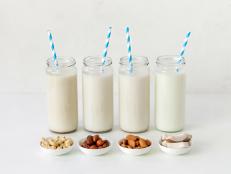One More Way Green Tea Could Be Good for Your Health
Flavan-3-ols are bioactive compounds found in foods like green tea that can benefit cardiovascular health, blood sugar control and more, according to research.

Elena Fedorina/Getty Images
Much of the time, when it comes to nutrition recommendations, people are often told what they need to remove or change about their dietary habits. If you find adding a habit or nutrient easier than eliminating one, you might want to ask your healthcare provider about flavan-3-ols. An expert panel at the Food and Nutrition Conference and Expo presented new guidelines based on large bodies of research that suggest simply adding flavan-3-ols to your existing diet may improve health outcomes. Read on to find out more.
What Are Flavan-3-ols?
Flavan-3-ols are a group of nonessential dietary bioactive compounds meaning they contain no or very few calories and are not vitamins or minerals. Bioactive compounds are naturally existing chemicals found in foods and some have been linked to improved health such as lycopene in tomatoes and resveratrol in grapes.
Research Shows Flavan-3-ols May Be Linked to Improved Health
The Academy of Nutrition and Dietetics (AND) published the first ever clinical guideline and intake recommendation for flavan-3-ols. The new guideline suggests 400 to 600 mg of flavan-3-ols per day from foods may reduce the risks associated with cardiovascular disease. Increased consumption of flavan-3-ol-rich foods has been linked to improved blood pressure, better cholesterol, and blood sugar control. It has also been determined that flavan-3-ols have several functions including antioxidant, anti-inflammatory and anti-carcinogenic properties.
As with all well-established, evidence-based recommendations, plenty of research preceded the new flavan-3-ol recommendation. The new guideline is based on data from 157 randomized control trials as well as 15 cohort studies .
What makes this guideline especially unique is that instead of being based on a correcting a nutrient deficiency, flavan-3-ols have been shown to improve health outcomes (specifically cardiovascular health and blood sugar control) when simply added to the existing diet. “The intake recommendation for flavan-3-ols ushers in a new era of nutrition science, where researchers are able to formulate diets that not only meet an individual’s basic nutrition needs, but those that promote longevity, healthy aging, and prevention of chronic disease,” said panelist Dr. Taylor Wallace of Think Healthy Group and George Mason University.
Foods with Flavan-3-ols
Some of the most plentiful sources of flavan-3-ols may already be in your kitchen: green and black tea, apples, pears, berries, cocoa products, dark chocolate, and red wine. An 8-fluid ounce portion of brewed green tea provides 320mg, while 1 cup of blackberries offers up 65mg. Three squares of 80% dark chocolate have 20mg and a small apple contains an additional 15mg.
- Green tea (8 ounces): 320mg
- Black tea (8 ounces): 280 mg
- Blackberries (1 cup): 65 mg
- Dried cranberries (1/2 cup): 35mg
- Dark chocolate (80% cocoa) (3 squares): 20 mg
- Red wine (5 ounces): 15 mg
- Apple (1 small): 15 mg
- Blueberries (1 cup): 10 mg
What About Flavan-3-ol Supplements?
The guideline put forth by AND is specific to food sources, not dietary supplements, but there are some products on the market offering flavan-3-ols in supplement form, which may be a way to help folks meet their needs. “Even with a well-balanced diet, reaching the recommended levels of flavanols on a daily basis can be challenging,” says Toby Amidor, MS, RD Healthy Eats contributor and partner with CocoaVia, a cocoa-based flavanol brand.
“A daily flavanol supplement is a simple and convenient way to fill in dietary gaps and reap the many heart health benefits these bioactives provide,” says Amidor. As with all dietary supplements, consumers should proceed with caution and speak with your healthcare provider. Flavanol supplements like green tea extract, for example, have been associated with liver damage.
Dana Angelo White, MS, RD, ATC, is a registered dietitian, certified athletic trainer and owner of Dana White Nutrition, Inc., which specializes in culinary and sports nutrition.
*This article was written and/or reviewed by an independent registered dietitian nutritionist.
Related Content:
































